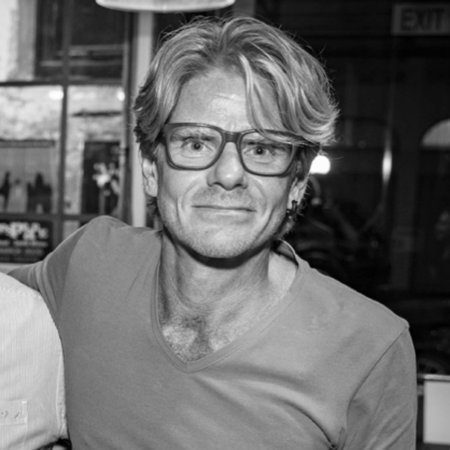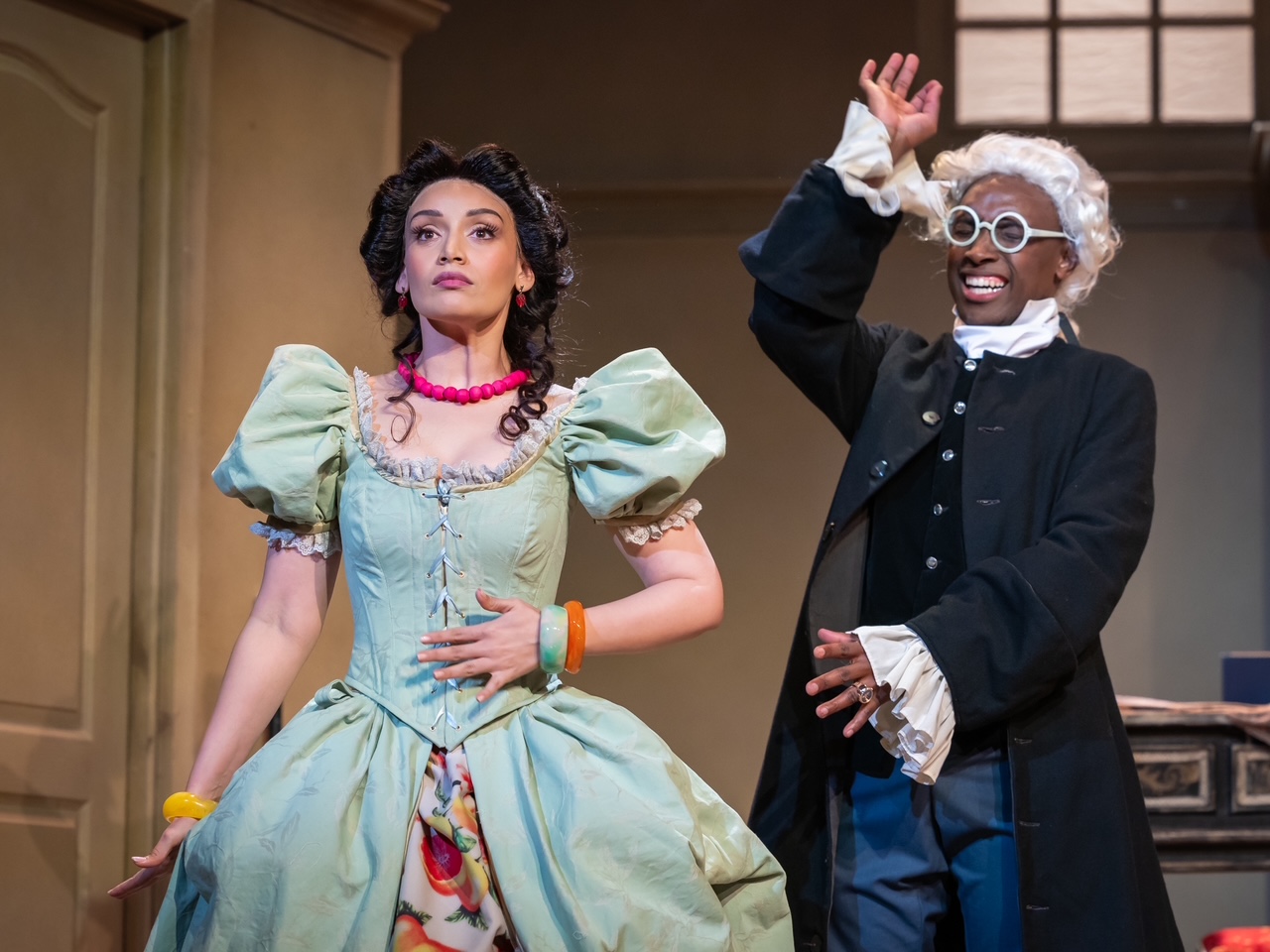It’s that narcotic moment of creative bliss, that point at which all the elements of a production magically coalesce, producing something far greater than the sum of its parts.
Getting there, though, seldom comes without side-effects. For theatre director Sylvaine Strike it’s been three weeks of voluminous ear worms.
She’d experienced a similar phenomenon while working on the musical Spring Awakening, but Strike says that directing her first opera has produced in her head an after-hours aftermath of unrelenting music and top-volume voices unlike anything she’s encountered before.
“It’s been relentless,” she says. “I tried driving home in silence – because that’s what I need after a full day of rehearsals. But it didn’t stop in the car. It didn’t stop in the shower. It did not stop when I climbed into bed. I had severe insomnia from it. I heard the music and singing constantly.”
Not that listening to it first-hand, in the rehearsal room, has in any way been unpleasant. Far from it: “It’s glorious to be in the presence of those voices,” Strike says.
It’s when it’s stuck in your head that it’s unforgiving.
/file/dailymaverick/wp-content/uploads/2025/08/Lusibalwethu-Sesanti-as-Berta-in-_The-Barber-of-Seville_-picture-by-Kim-Stevens.jpg)
The opera is The Barber of Seville, Italian composer Gioachino Rossini’s comic masterpiece, and the ear worms are as much down to the addictive beauty and hypnotic power of the music Strike has been hearing all day, every day for three weeks, as it is a consequence of her obsessive dedication to the work.
It’s been a mighty task. Aside from shaping the opera she has been consumed by the challenge of fashioning the singers from two casts into formidable physical comedians.
Part of the encouragement was to shift the focus outwards. “I asked the singers to make each moment about the other person in the scene,” says Strike. “Whether it’s the rich and handsome count you’re falling in love with or the young woman you want but can’t have because you’re an old fart, I said make it about that person… Once they took the licence to not focus on themselves, they started to play.”
The other encouragement was to not take themselves too seriously. To have fun and embrace the comedy. Once this freedom had been unlocked, a momentous transformation happened.
I witnessed the results of the singers leaning into this newfound playfulness during their final day in the rehearsal room, a week before opening at the Theatre on the Bay on 5 August.
Rehearsing that afternoon was the so-called Red Cast: the dashingly handsome Innocent Masuku (the London-based South African tenor who made a name for himself by reaching the finals of Britain’s Got Talent last year) in the role of Count Almaviva; local superstar soprano Brittany Smith as an utterly enchanting Rosina; ebullient baritone Thando Zwane as Figaro, the titular barber who is in fact a hustler who’ll do anything for money; and a hilariously self-aware Conroy Scott as the aforementioned old fart, Dr Bartolo, who schemes of marrying the much, much younger Rosina.
Each of them was sublime – as was the rest of the cast of colourful characters, and the all-male chorus, who at one point spontaneously began dancing, one of the many natural expressions by the performers in response to the music that Strike decided to keep in the show, “because it’s their truth in that moment”.
It was the Cape Town Opera company like never before: having the time of their lives, not only singing their hearts out, but expressing the opera’s hilarity with their entire bodies. It was enthralling to say the least, everyone consumed by the magic of the music, the madcap comedy fully embodied.
Watching them play, having fun as they sang and leaned into the ridiculousness of the comedy, I completely forgot that I don’t understand Italian. The story came alive, crisp and clear and compelling.
“I just told them to own it,” says Strike. “Own the joy! Own the hilarity! For God’s sake, it’s a farce!”
Own it they do.
/file/dailymaverick/wp-content/uploads/2025/08/Innocent-Masuku-as-Count-Almaviva-and-Brittany-Smith-as-Rosina-in-_The-Barber-of-Seville_-picture-by-Kim-Stevens.jpg)
While the story’s way more convoluted than your average opera and can cause confusion because of its strange twists and turns and Almaviva’s various disguises, Strike has made it so visually vivid that even a Rossini virgin will follow the action without knowing a word of Italian. “I was obsessive about sculpting every moment in order to make the meaning clear,” she says.
Strike, who trained at the Lecoq School in Paris and has practised physical theatre for decades, draws on a rich tradition of embodied comedy that goes back to Commedia dell’arte and draws on a range of movement techniques, even tai chi.
“It’s a lot to ask of them,” Strike says. “Comedy is terribly, terribly hard. And they’re singing at the same time, so there’s the technique required to deliver the vocals while performing the comedy.”
Her approach is to give the performers agency. “I’m not a director who tells you what to do,” she says. Instead, it’s been up to each singer to find the physicality of their character.
Strike says the process has been incredibly liberating, giving the singers new tools with which to connect to their character’s truth. “It’s not cerebral in any way,” she says. “Just take the thinking away and sing with the entire body.”
Apart from giving the singers licence to play, Strike has also added a meta layer to the performance by bringing accompanying pianist Jan Hugo, who is also the show’s musical director, into the opera. His role? Rossini himself, composing in real time.
“We’re not going to pretend that there isn’t a piano accompanying them, because I think that’s disrespectful to the pianist,” Strike says. “And I love the idea that Rossini is there with us, creating the opera as it unfolds.”
/file/dailymaverick/wp-content/uploads/2025/08/Brittany-Smith-as-Rosina-and-Thando-Zwane-as-Figaro-in-_The-Barber-of-Seville_-picture-by-Kim-Stevens.jpg)
It is not only respectful, but has created an opportunity for comic interaction between Rossini and the singers who are performing his opera. It’s especially fun in those moments when the performers get a chance to express their exasperation at the extreme demands Rossini placed on the singers.
And it’s true, Rossini’s schtick was writing extremely demanding songs. It’s a bel canto opera, meaning that it’s very expressive and literally packed with “beautiful singing”, with a lot of trilling up and down the scales, arias that build and build at pace as though they exist to showcase the extreme potential of the human voice.
It’s music designed to show off the agility, speed and prowess of the singers who are required to perform some hardcore vocal gymnastics. Some of the songs feel like a comedic, galloping race to a finish line that refuses to appear. Never mind the absolute loveliness of the melodies.
The opera’s opening night in Rome in 1816 was a disaster, although not because of the material.
It’s believed that a rival composer who had created another opera based on the same play had hired hecklers to boo the premiere performance. When Rossini stepped out to conduct the orchestra, his outfit apparently attracted laughter, and then not only did a black cat at some point pad across a stage full of superstitious opera singers, but one of them fell on his face and broke his nose. The show continued but there was blood everywhere.
Despite the unmitigated fiasco of opening night, it’s become perhaps the most-produced and best-loved comic operas yet made, and its music, undoubtedly well ahead of its time, has influenced and infiltrated popular culture in myriad ways (from Bugs Bunny’s Rabbit of Seville to an episode of The Simpsons, several of the songs are widely recognisable).
Rossini’s genius is irrefutable, and he wrote operas like a machine, composed two a year for 19 consecutive years and retired by the age of 40. He was just 24 when he dashed off The Barber of Seville – in under three weeks, according to most musicologists.
“It’s just ridiculous,” Strike says of the pressure Rossini must have felt to meet his commission deadline in time for the singers to learn their parts and pull the show together.
The composer was known in his day as Señor Crescendo, attributable to the manner in which his music would repeatedly build and then come down.
“It must have been like pop music to audiences when they first heard it,” Strike says. “It’s witchy music. It’s wrong. The cadences are out. It’s pushing the boundaries. Utterly revolutionary for its time.”
Watching the rehearsal, witnessing the hilarity and properly comprehending the music for the first time, what struck me was how “mathematical” Rossini’s compositions are.
In his madcap imagination, he must have calculated the comedy so precisely in order to make it work as an effect of the music which so cleverly and clearly conveys the mounting madness of the farcical plot.
“It is mathematical,” Strike says. “He wrote comedic moments into the music. It’s like Beckett, so timing-based. You sort of hear Buster Keaton, Charlie Chaplin, Laurel and Hardy, that chase-scene music of silent-era movies… He was inventing a kind of music for comedy that would eventually become definitive.”
Strike believes the music fits the “complicated puzzle” that is at the heart of the comedy. “It’s complex and intricate and it’s the nature of farce, which involves confusion and disguises and the mistaken identities and the pursuit of something.”
And, apart from a comedic sensibility that was avant-garde for the time, Rossini seemed to also have a taste for parody.
There are instances in The Barber of Seville where he appears to laugh at the institution of opera itself to some extent, poking fun at the form while simultaneously expanding its possibilities, revelling in the potential to play and experiment and push the boundaries.
“There are these moments when Rossini simply decided there was going to be ‘more’, and then some more again,” Strike says. “And so some of the songs are florid and embellished and they go on and on, really testing the singers.
“That’s why in this production we have comedic moments in which we see the singer’s frustration because an aria just never ends. It’s a dig at the reverential way people saw opera – and still do today. Rossini was evidently having a laugh while milking it in the most extraordinary, genius way, because the compositions are so fine and beautiful. And because he could. As though he was saying, ‘Screw you all, it’s not actually all that serious. We can have a laugh at the opera.’”
And Rossini is laughing to this day. No doubt rolling in his grave as those ear worms persist 200 years after conjuring them into existence. DM
The Barber of Seville is playing at Theatre on the Bay in Cape Town from 5 though 17 August.





 Brittany Smith as Rosina and Innocent Masuku as Count Almaviva in The Barber of Seville. (Photo: Kim Stevens)
Brittany Smith as Rosina and Innocent Masuku as Count Almaviva in The Barber of Seville. (Photo: Kim Stevens)